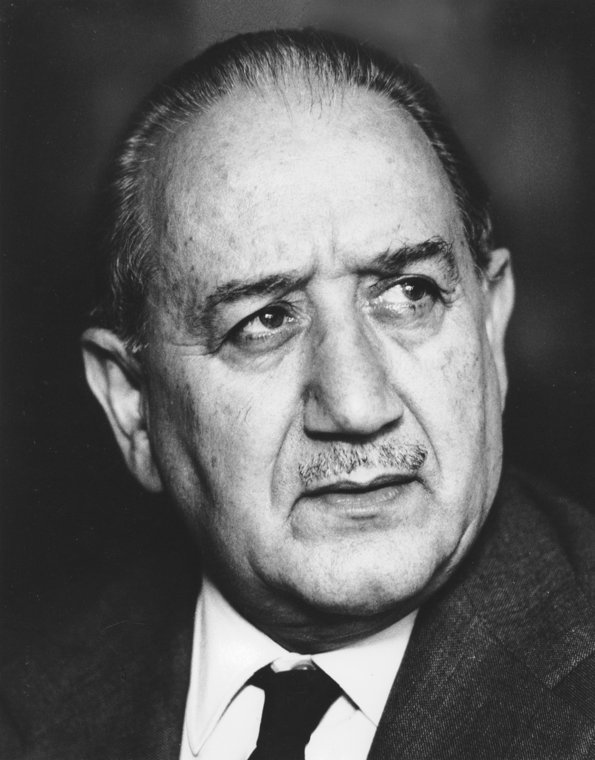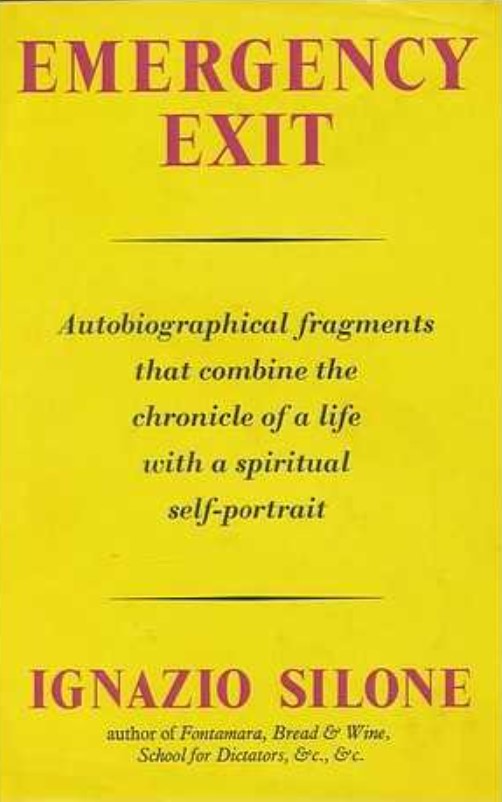Humanity is always an option
In memory of Ignazio Silone’s “Emergency Exit”
by Karl-Jürgen Müller
Sometimes, books written many decades ago have more to say about our world today, our politics and us humans than all the media coming to us every day. Such books, carefully interpreted, can also be a help in orienting ourselves in our world today and in taking meaningful steps in life. Above all, they can stimulate our thinking, appeal to our compassion, and thus strengthen our humanity. At least this is what the author of the following lines thinks regarding a book published 55 years ago by the great Italian writer Ignazio Silone.
Socialist of conscience in a time of political abysses
Ignazio Silone’s book, which first appeared in English translation in 1968, is entitled “Emergency Exit”. It is a kind of biography of the author, beginning with thoughts about his childhood and his relationship with his father, a poor small farmer in the Italian Abruzzi, and ending with a detailed essay about the time in which the book was written: the time of the incipient European affluent society in the first post-war decades. Silone had experienced the political abyss in the decades before the end of the Second World War, was himself a player on the political stage for years, but drew consistent conclusions from his political experience becoming mainly a writer and fellow human being in his later years.
His German publisher writes about him: “Ignazio Silone (actually Secondo Tranquilli) was born on 1 May 1900 into a family of small farmers in the mountain village of Pescina. His childhood was marked by economic hardship and social tensions. His political commitment developed early: in 1917 he became involved in self-help organisations improving the social position of agricultural workers. A year later, he moved to Rome where he began his political career by joining the socialist movement. These activities were already observed by the police in 1919, which did not prevent him from founding the Italian Communist Party (PCI) the following year with Antonio Gramsci and Amadeo Bordiga. As a member of the Central Committee, he was responsible for international contacts. In 1922, the year of the fascist takeover, he was arrested in his Trieste editorial office. After his release in 1923, he went underground for good. He went on to Germany, France and Spain, but returned to Italy in 1925. Two years later, in Moscow, he witnessed the political liquidation of Trotsky and Zinoviev imposed by Stalin. Silone’s protest against it marked the beginning of his estrangement from the Communist Party. In 1929, his ideological isolation began as the leadership of the PCI split into Moscow loyalists and independents; in 1931, he was expelled from the party under pressure from the Communist International.”
Love for the poor and oppressed
Regarding his books, which he began writing in Swiss exile from 1930 onwards, it states: “Silone was critical of the fascist politics of his homeland and increasingly took a distanced position against the dictatorial leadership of the parties committed to the resistance. It was not world revolution that drove him but love for the poor and oppressed. This is also manifested in his style, which is characterised by a simple language that can be understood by a wide range of readers. Throughout his life, however, Silone remained an outsider.”
And after the war? “After the liberation of Italy in October 1944, he returned to Italy, but found it difficult to gain a foothold among intellectuals. His anti-ideological, individualistic understanding of socialism increasingly isolated him from Marxist dogmatists. Instead, he called for a redefinition of the socialist ideal as a utopia, which should be linked to timeless idealistic values and ideals of the Christian occidental tradition. Renunciation of ideology, freedom of thought for the members and a non-hierarchical organisation were enormously important to him. However, his anti-ideological, liberal programme met with little response. Increasingly disappointed, he withdrew from party work and from 1950 onwards devoted himself only to his literary works. He died in a Geneva clinic on 22 August 1978. The close connection between life, politics and work is characteristic of this deeply human and committed novelist.”
Compassion and empathy instead of nihilism
Much of what is presented here becomes vivid in the book “Emergency Exit”. The title of the book takes up that of the chapter in which Silone describes his experiences in Moscow at the time of Stalin and his inner turning away from the Communist Party.
Each chapter of this book is well worth reading. Here, only one will be discussed in more detail. It is entitled “The Choice of Companions”* and is an impressive testimony to his changing relationship to the political significance of the proletariat, the working class, a restatement of the reasons for his turning away from the Communist Party, but above all a confrontation with the nihilism prevalent in his time among intellectuals, writers, and artists.
“The number of writers who have voluntarily gone to their deaths in various countries during the last decades is greater than in any previous epoch.” So reads the first sentence of the chapter. And already in the second, there is an answer to the question of the cause: “It seems to me that most of these sad cases, as different as they are externally, have a common background: what Nietzsche called the nihilism of the new age”.
Even freedom can be wasted senselessly, if it does not serve life
Silone defines the nihilistic attitude as “equating the true, the good and the right with self-interest”, as a “"Conviction that all doctrines of faith and doctrines are mere words and that, in the end, all that matters is success”. Even freedom, “if it does not serve life but is senselessly wasted, can be nihilistic, turn into slavery and lead to suicide or crime”.
Nihilism also includes the abuse of words and ideas: “Without any concerns, traditional moral and religious values had been called to support the threatened interests, thereby calling them into question”.
Silone goes on to discuss the relationship between the emergence of nihilism and the political and social situation of his day: The “frailty of the myths of progress on which the capitalist view of life and way of life were based”, which became apparent during the First World War, the “authoritarian restoration” in the 1920s and 1930s, which promised to be a “remedy” for nihilism, but in fact “aggravated the evil”. Finally, he goes into fascism. In its various forms, it meant “the enthronement of nihilism”. Even after the Second World War, nihilism had not disappeared, “its deadly germs” lived on “in the depth”.
Strength that arises in the human being from his attachment with his neighbour
“What is to be done?” Silone asks. His answer is “I see only one way of liberation: to advance from the surface of the emerging phenomena into the depths and to explore them courageously with absolute intellectual honesty and sound sensibility”. Writers like Albert Camus had threaded the path away from an initially nihilistic attitude that believes nothing but senselessness in life, towards a real way out. “Camus finds the remedy for this bleak feeling of senselessness in compassion. ‘The world in which I live I find disgusting [...] but I feel solidarity with the people who suffer.’” Thus, in Camus’ novel “The Plague”, the life of the characters are “no longer presented as an indifferent sequence of arbitrary events, but as an encounter of people who suffer together and struggle against the same fate.” After further examples, Silone speaks of a “way out of nihilism thanks to a strength that arises in the human being from his attachment with his neighbour”.
Conscience instead of party ...
Silone describes how he had joined the socialist and communist movement because of his early companions, the day labourers of his birthplace, and had believed for many years that he could overcome nihilism and solve the social question with the help of the class of proletarians. Now, however, he had to realise that the proletariat, the working class, was deeply divided and that even as a class it was no longer a guarantor of progress. It was much more a matter of the conscience of the individual.
He opposes the “nihilistic worship of power and success” with the advocacy of rights. He writes: “If what is understood by right and wrong is at all recognisable, it is certainly not through the ephemeral emphasis that power and success confer”. Using the example of the Spanish Civil War, he explains what it means to think and act only in terms of parties and their struggles for power. Not least with regard to his own, the Communist Party, he writes about parties: “The deadly mechanism is always the same: every organisation or institution arises to fight for an ideal; but gradually it identifies itself with this ideal and finally puts itself in its place, and its own interest comes first in the scale of values. [...] The party members do not feel aggrieved, they even see an advantage in the fact that they are finally relieved of any personal responsibility.” He quotes from a letter written in the spring of 1938 by Simone Weil, who had sympathised with the Republican side in the Civil War: “One goes out as a volunteer, filled with ideals and a spirit of sacrifice, and all of a sudden a fight for freedom becomes a kind of mercenary war, only with much more cruelty and less respect for the enemy.”
… and fidelity to people
Thinking and acting according to one’s own conscience is something else: “In any case, fidelity to the people who were persecuted for their love of freedom and justice is a commandment of personal honour that obliges us more than any abstract programmatic formulation.” So, it is not the party that can lead to overcoming nihilism and solving the social question, but only thinking, feeling and acting as responsible fellow human beings.
This is based on a fundamental trust: “It is based primarily on the inner certainty that we human beings are free and responsible human beings; it is based on the fact that human beings have an unavoidable need to participate in the reality of others; it is based on the possibility of a wordless understanding of souls. Is not this possibility proof of the fraternal bond between human beings? Love for the oppressed arises from this as a necessary consequence that cannot be shaken by any historical disappointment, for it is not a love that is concerned with its own advantage, and its permanence does not depend on success. How, with these certainties as the basis of life, is one to resign oneself to the fact that in the poorest and most unfortunate creatures human possibilities are simply stifled? And how is one to understand a morality that turns a deaf ear to this essential obligation? But this obligation has nothing to do with political machinations.” For: “It is undoubtedly the worst blasphemy to use the oppressed as a stepping stone to come to power oneself, and then to betray them, for they are the most defenceless of men.”
And all this without becoming unrealistic: “We must honestly admit that we do not know a panacea. There is no panacea for social hardships. It is already a lot if we have enough confidence to move on. We must walk under an ideologically dark sky; the old clear southern sky with its shining stars is now overcast, but the remaining sparse light at least allows us to see where we put our feet.” •
* All quotes translated by Current Concerns.

